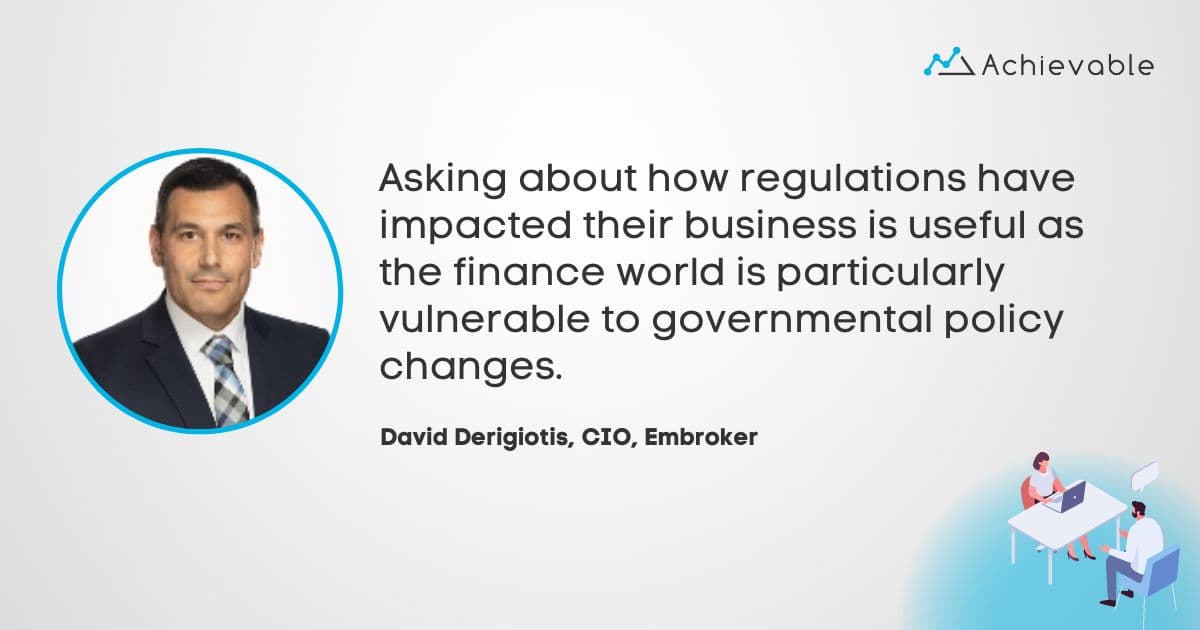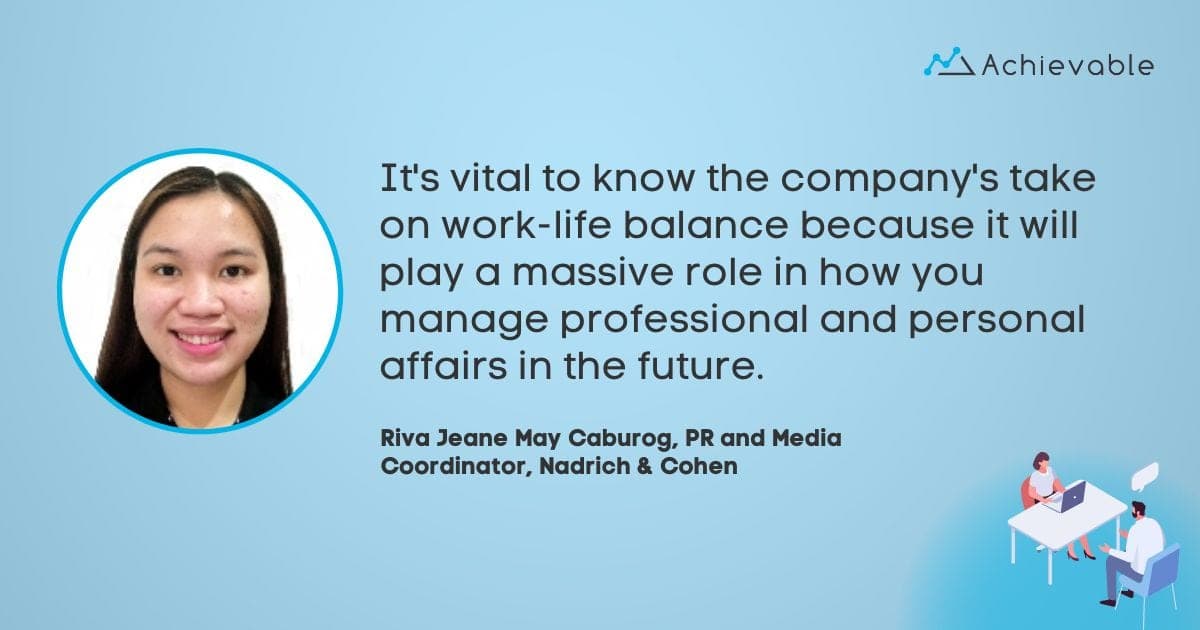
From asking about legal regulations to taking an interest in economic factors, here are 10 answers to the question, “What are some important questions to ask in a finance job interview?”
Asking about how regulations have impacted their business is useful as the finance world is particularly vulnerable to governmental policy changes. Laws that touch on everything from accountability to legal requirements can impact a finance business in items such as staffing, compliance costs, and future strategies.
In inquiring about this issue, it shows your awareness of how sensitive finance businesses are to laws, that you pay attention to details, and that you recognize the need to adjust to meet these challenges. It also demonstrates how acutely aware you are of the legal sensitivities of the financial world, and that you are both cognizant of the challenges and have the forethought to be proactive rather than reactive in your actions.
David Derigiotis, CIO, Embroker

Many financial firms have a well-known reputation for being pressure cookers, with staffers dropping like flies if they can’t handle the pace, conditions, or working environment. Asking this question is a good way to scout out for information ahead of time, as you can tell a lot based on the interviewer’s response.
You’re never going to hear that the reason the position is empty is that someone attrited out, but by reading between the lines, you should be able to tell what the situation behind the scenes is.
It won’t always be something you need to do, naturally, as plenty of positions are because of perfectly benign reasons such as expansion, promotion, or maternity cover, but it always bears asking.

Dragos Badea, CEO, Yarooms
By asking this question, you are showing strategic vision and a long-term commitment to the role. The world of finance is always changing, so if you understand this and will adapt, you will be seen as an asset.
Also, you should be ready to try new things, learn new skills, and collaborate with new partners. Remember that recruiters prefer candidates who can keep their eye on the ball and react quickly to new challenges.

Shawn Plummer, CEO, The Annuity Expert
If you are interviewing for a client-facing job, ask the interviewer about how the organization guides clients through financial decisions during hardships. This will not only show your own empathy and open up the floor for your ideas, it will give you an idea of the company culture.
In finance, how you treat your clients in times of financial hardship is as important, if not more so, than how you handle their finances during times of plenty.

Gates Little, President and CEO, altLINE Sobanco
Asking the interviewer about career opportunities allows you to gauge your chance to grow professionally. It’s not a secret that the financial sector is highly competitive, and getting promoted can take time and effort.
Sometimes, employees working in finance find it hard to move up the corporate ladder because of their lack of qualifications or simply because there is little to no room for growth available.
What’s great about being curious about career opportunities is that you’ll know if a company offers intensive leadership training for employees and fosters upward mobility. This will help you decide if the organization’s values and culture align with your goals, especially regarding career development.

Allan Stolc, Founder, Bankly.dk
When interviewing for a financial position, understanding and showing interest in the company’s financial operations is essential. Thus, ask how the company measures success in its financial performance.
The answer might provide insight into the company’s methods of operation and tools used. Additionally, by finding out how they measure success, you can better understand your role in contributing to the company’s goals and what they expect of you in terms of performance.
This information gives you valuable information on the company’s financial metrics and targets and reveals priorities and values. All of this gives you knowledge that can come in handy at the following stages of recruitment and allows you to answer the recruiter’s questions more accurately and with a greater understanding of the company’s operations.

Nina Paczka, Community Manager, Resume Now
This is an important question to ask and will give you an idea of the challenges you will face in the finance position. Different industries and companies face different economic challenges, and this will play a large role in your day-to-day life if you pursue this opportunity.
It will probably impress the interviewer that you are asking tough questions, and they should give you an honest answer. Since we are in a recession, this makes it even more important to ask this question during your interview.

Scott Krager, Founder, Key Fob Replacement
Finance roles and firms are not all created equal, so it’s essential to see why the recruiter or hiring manager chose this role over others and stayed around. You can see whether your impression of company culture and engagement is correct and uncover the firm’s or institution’s biggest USPs. Hopefully, they align with yours!
The question also signals to the interviewer that you’re not just looking for a steady paycheck or the biggest salary and that you care to find a great fit. You should go to the interview armed with your own “why” because the interviewer will also be curious to see what’s drawing your interest to the role.

Maximilian Wühr, CGO and Co-Founder, FINN
Working in finance is a fulfilling career, but it also often entails a significant sacrifice in your personal life. It’s vital to know the company’s take on work-life balance because it will play a massive role in how you manage professional and personal affairs in the future.
It also allows you to assess in advance the environment you’ll be exposed to once you work for the company. After a successful interview, the decision to accept a job offer depends primarily on your priorities. A rewarding pay and a solid career path can be good reasons to pursue the position, but take it not at the expense of your mental health and personal growth.
Riva Jeane May Caburog, PR and Media Coordinator, Nadrich & Cohen

Of course, you need to know the details of your position in order to make the correct decision for your career, but you should also know how your role will blend within the company.
Understanding the broader picture not only helps you weigh the decision should there be an offer, but it also helps you understand other elements of the company. Depending on the level at which your role interacts with other departments, you can measure how much the company values collaboration and teamwork. This will give you a good understanding of company culture and help guide your final decision.

David Lewis, CEO and Founder, Monegenix

Want to work in finance but don’t know where to start?We walk you through the two main ‘sides’ of finance, the buy side and the sell side, as well as which roles fall into each category and what kind of work they entail. Brandon Rith shares his knowledge of Investment Banking (IB), Private Equity (PE), asset management firms, and hedge funds.

Interested in careers in finance? In this post, we walk you through the different career paths in finance and securities to help you decide where you want to go.

A complete walkthrough of how to get sponsorship for Series 7 licensing, including what sponsorship means, how to apply, Form U4, and what to do if you can’t get sponsored.